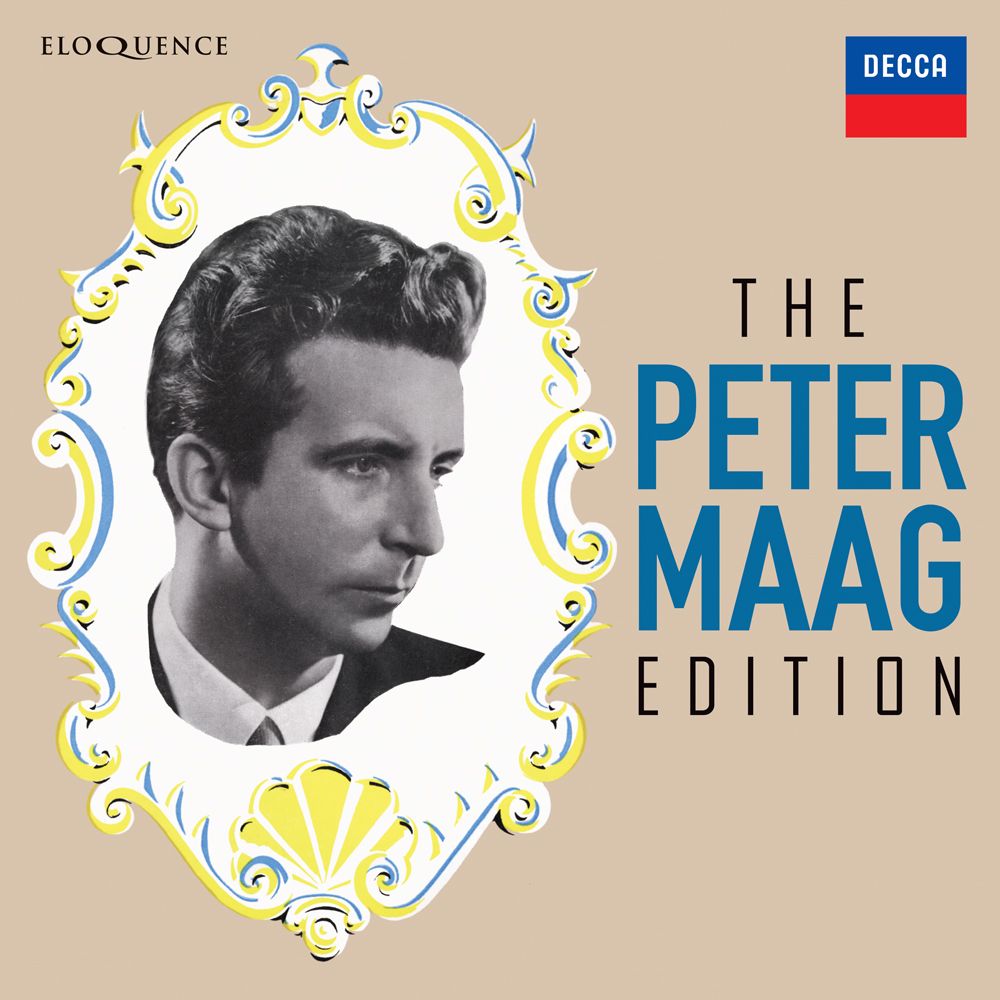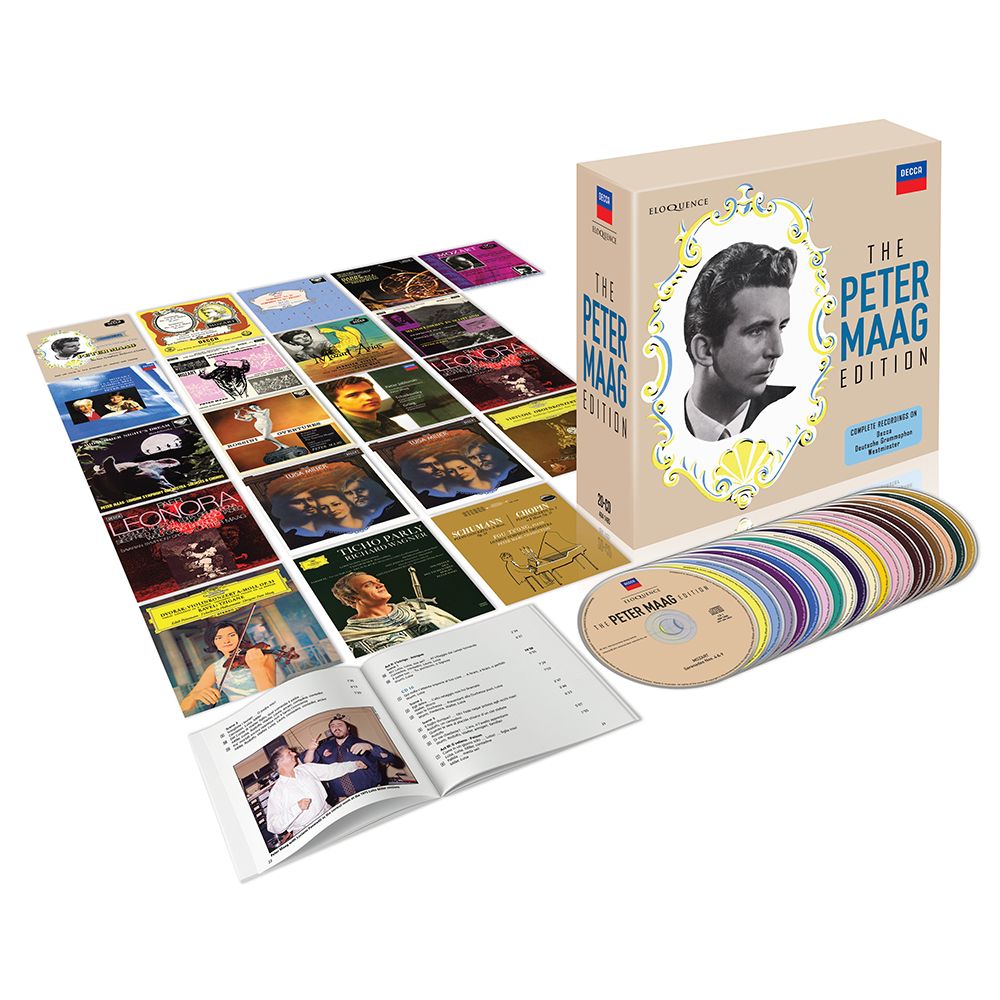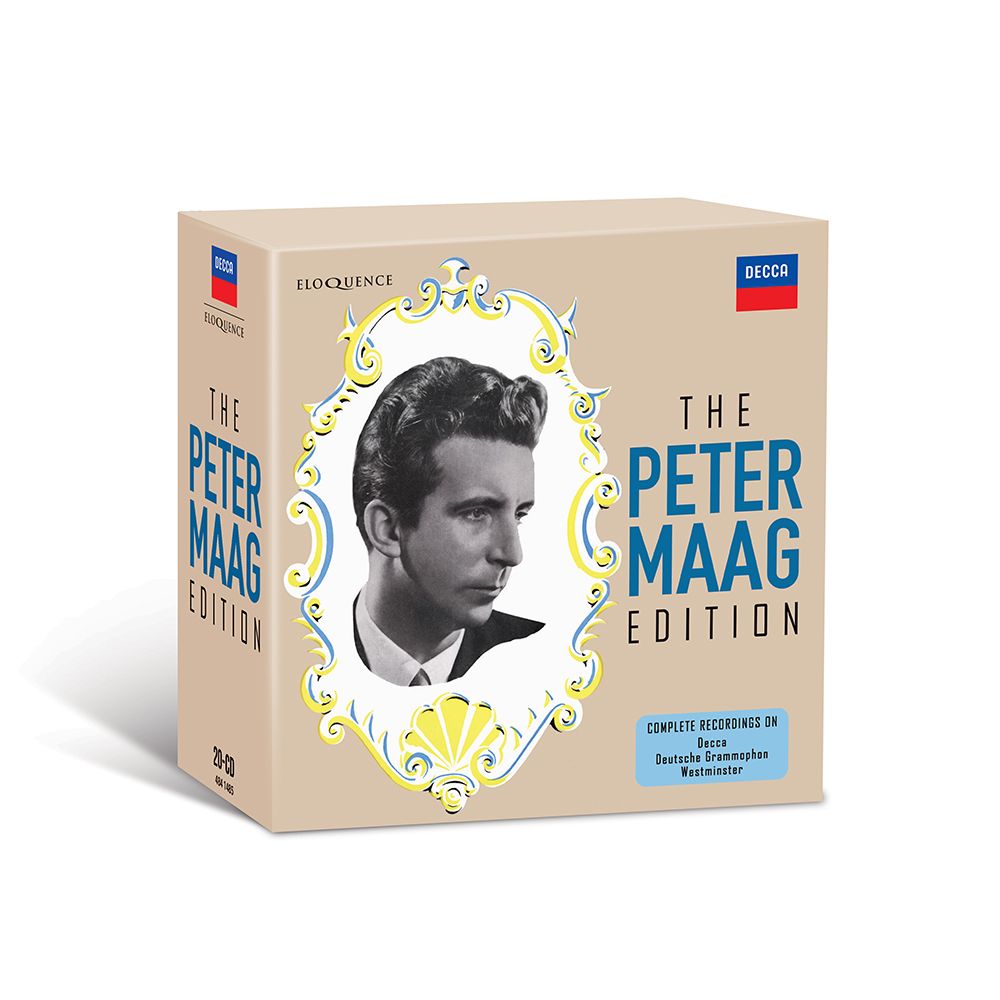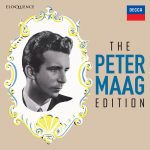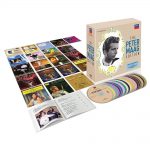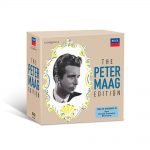Newly compiled for the first time, the Decca career of a pre-eminent Mozart conductor, complemented by his recordings for Deutsche Grammophon and Westminster.
Peter Maag began his career as a pianist, but turned to conducting with the encouragement of Wilhelm Furtwangler. He made his first Decca recording having lately turned 30, with the Suisse Romande Orchestra whose founder-director, Ernest Ansermet, also gave his fellow Swiss conductor much early encouragement. Critics recognised Maag as a natural Mozartian, and his first seven Decca recordings were exclusively dedicated to the composer’s serenades, symphonies and arias (accompanying Jennifer Vyvyan and Fernando Corena).
In the late 1950s, Maag embarked on a fruitful relationship with the LSO, which yielded more Mozart and then classic accounts of Mendelssohn – the Scottish Symphony and music for A Midsummer Night’s Dream – for which the conductor’s lightness of touch and firm rhythmic hand were ideally suited. These qualities also found him at home in ballet – there are beautifully sprung accounts here of Les Sylphides and La Source – and the Italian operatic repertoire.
As well as a long-prized disc of Rossini overtures, this box gathers up Maag’s pioneering recording of a forerunner to Fidelio, Paer’s Leonora, and Verdi’s Schiller-rarity, Luisa Miller, with a cast led by Luciano Pavarotti (who had already worked on the piece with the conductor for Italian radio).
Maag brought the best out of both vocal and instrumental soloists, and many of his records find him in the role of accompanist, to Julius Katchen near the start of his career and Barry Tuckwell for his first Decca recording, with the late Fou Ts’ong in 1962, and to Peter Jablonski and Joshua Bell near the end. In between he made a trio of less-familar albums for Deutsche Grammophon, a suave foil to Heinz Holliger in Baroque oboe concertos, to Edith Peinemann in Dvořák’s Violin Concerto and Ravel’s Tzigane, and to the Danish Heldentenor Ticho Parly for a Wagner recital. Jablonski and Tuckwell contribute personal reminiscences of working with Maag for the booklet notes.
– – –
CD 1
WOLFGANG AMADEUS MOZART (1756–1791)
Serenade No. 4 in D major, KV 203
Serenade No. 9 in D major, KV 320 ‘Posthorn’
Jean Pougnet, violin (KV 203)
New Symphony Orchestra of London (KV 203)
Orchestre de la Suisse Romande (KV 320)
CD 2
WOLFGANG AMADEUS MOZART (1756–1791)
Symphony No. 28 in C major KV 200 (189k)
Symphony No. 29 in A major KV 201 (186a)
Symphony No. 34 in C major, KV 338
Orchestre de la Suisse Romande
CD 3
WOLFGANG AMADEUS MOZART (1756–1791)
Symphony No. 32 in G major, KV 318
Symphony No. 38 in D major, KV 504 ‘Prague’
Clarinet Concerto in A major, KV 622
Gervase de Peyer, clarinet
London Symphony Orchestra
CD 4
WOLFGANG AMADEUS MOZART (1756–1791)
Horn Concerto No. 2 in E flat, KV 417
Horn Concerto No. 3 in E flat, KV 447
Horn Concerto No. 1 in D major, K.386b (KV412 & 514)
Horn Concerto No. 4 in E flat, KV 495
Fragment from Horn Concerto in E major, KV Anh.98A: Allegro
Barry Tuckwell, horn
London Symphony Orchestra
CD 5
WOLFGANG AMADEUS MOZART (1756–1791)
Piano Concerto No. 13 in C major, KV 415
Piano Concerto No. 20 in D minor, KV 466
Julius Katchen, piano
New Symphony Orchestra of London
CD 6
WOLFGANG AMADEUS MOZART (1756–1791)
Violin Concerto No. 3 in G major, KV 216
Adagio in E major for Violin and Orchestra, KV 261
Violin Concerto No. 5 in A major, KV 219
Rondo in C major for Violin and Orchestra, KV 373
Joshua Bell, violin
English Chamber Orchestra
CD 7
WOLFGANG AMADEUS MOZART (1756–1791)
Notturno in D major, KV 286
Serenata notturna in D major, KV 239
Lucio Silla – Overture, KV 135
Thamos, König in Ägypten – Interludes, KV 345
London Symphony Orchestra
CD 8
WOLFGANG AMADEUS MOZART (1756–1791)
Six German Dances, KV 509
German Dances from KV 600, 602, 605
London Symphony Orchestra
Don Giovanni, KV 527
Madamina, il catalogo è questo; Ah! pietà, signori miei!
Le nozze di Figaro, KV 492
Se vuol ballare, signor Contino; La vendetta, oh, la vendetta
Fernando Corena, bass
L’Orchestre de la Suisse Romande
Ah se in ciel, benigne stelle, KV 538
Mass in C minor, KV 427 ‘Grosse Messe’: Et incarnatus est
Exsultate, jubilate, KV 165: Alleluia
Jennifer Vyvyan, soprano
London Philharmonic Orchestra
CD 9
FELIX MENDELSSOHN (1809–1847)
Symphony No. 3 in A minor, Op. 56, MWV N 18 ‘Scottish’
Overture: The Hebrides, Op. 26 (Fingal’s Cave)
London Symphony Orchestra
CD 10
FELIX MENDELSSOHN (1809–1847)
Overture ‘A Midsummer Night’s Dream’, Op. 21
A Midsummer Night’s Dream: Incidental Music, Op. 61
Jennifer Vyvyan, Marion Lowe, sopranos
Chorus of the Royal Opera House, Covent Garden
London Symphony Orchestra
FRÉDÉRIC CHOPIN (1810–1849)
Les Sylphides (arr. Roy Douglas)
Orchestre de la Société des Concerts du Conservatoire de Paris
CD 11
GIOACHINO ROSSINI (1792–1868)
Overtures
Guillaume Tell
La Cenerentola
Semiramide
La gazza ladra
LÉO DELIBES (1836–1891)
La Source, ou Naila – ballet (excerpts)
Orchestre de la Société des Concerts du Conservatoire de Paris
CD 12
PYOTR ILYICH TCHAIKOVSKY (1840–1893)
Piano Concerto No. 1 in B flat minor, Op. 23
EDVARD GRIEG (1843–1907)
Piano Concerto in A minor, Op. 16
Peter Jablonski, piano
Philharmonia Orchestra
CDs 13 & 14
FERDINANDO PAER (1771–1839)
Leonora
Florestano…………………………..……..Siegfried Jerusalem
Leonora……………………..…………..Ursula Koszut
Rocco……………………..…………..Giorgio Tadeo
Marcellina…………………..……………..Edita Gruberová
Giacchino……………………..…………..Wolfgang Brendel
Don Pizzarro…………………..……………..Norbert Orth
Don Fernando…………………………..……..John van Kesteren
Symphonieorchester des Bayerischen Rundfunks
CDs 15 & 16
GIUSEPPE VERDI (1913–1901)
Luisa Miller
Luisa…………………………..…….. Montserrat Caballé
Rodolfo…………………………..……..Luciano Pavarotti
Miller…………………………..……..Sherrill Milnes
Federica…………………………..……..Anna Reynolds
Count Walter…………………………..……..Bonaldo Giaiotti
Wurm…………………………..……..Richard Van Allan
Laura…………………………..……..Annette Celine
A peasant…………………………..……..Fernando Pavarotti
London Opera Chorus
National Philharmonic Orchestra
CD 17
VINCENZO BELLINI (1801–1835)
Concerto in E flat major for Oboe and Orchestra
ANTONIO SALIERI (1750–1825)
Concerto in C major for Flute, Oboe and Orchestra
DOMENICO CIMAROSA (1749–1801)
Oboe Concerto in C major
GAETANO DONIZETTI (1797–1848)
Concertino in G major for Cor anglaise
Heinz Holliger, oboe, cor anglais
Aurèle Nicolet, flute
Bamberger Symphoniker
CD 18
ANTONÍN DVOŘÁK (1841–1904)
Violin Concerto in A minor, Op. 53
MAURICE RAVEL (1875–1937)
Tzigane – Concert Rhapsody for Violin and Orchestra
Edith Peinemann, violin
Czech Philharmonic Orchestra
PETER MAAG
CD 19
RICHARD WAGNER (1813–1883)
Lohengrin: In fernem Land, unnahbar euren Schritten
Tannhäuser: Inbrunst im Herzen
Parsifal: Nur eine Waffe taugt
Die Walküre: Winterstürme wichen dem Wonnemond
Die Walküre: Ein Schwert verhieß mir der Vater
Siegfried: Nothung! Nothung! Neidliches Schwert!
Siegfried: Hoho! Hoho! Hohei! Schmiede, mein Hammer, ein hartes Schwert
Siegfried: Daß der mein Vater nicht ist – Waldweben
Götterdämmerung: Brünnhilde, heilige Braut!
LUDWIG VAN BEETHOVEN (1770–1827)
Fidelio: Gott! Welch’ Dunkel hier!
CARL MARIA VON WEBER (1786–1826)
Der Freischütz: Nein, länger trag’ ich nicht die Quälen … Durch die Wälder, durch die Auen
Ticho Parly, tenor
Orchester der Deutschen Oper Berlin
CD 20
ROBERT SCHUMANN (1810–1856)
Piano Concerto in A minor, Op. 54*
FRÉDÉRIC CHOPIN (1810–1849)
Piano Concerto No. 2 in F minor, Op. 21*
Fou Ts’ong, piano
London Symphony Orchestra
PETER MAAG
FIRST RELEASE ON CD
CD 1
Recording Producers: James Walker (KV 203); Victor Olof (KV 320)
Balance Engineers: Kenneth Wilkinson (KV 203); Gil Went (KV 320)
Recording Locations: Decca Studios, West Hampstead, London, UK, 10–11 January 1955 (KV 203); Victoria Hall, Geneva, Austria, 12 October 1951 (KV 320)
Original Decca Releases: LXT 5074 (KV 203): September 1955; LXT 2671 (KV 320): March 1952
CD 2
Recording Producer: Victor Olof
Balance Engineers: Arthur Haddy (Symphonies Nos. 28, 34); Gil Went (Symphony No. 29)
Recording Location: Victoria Hall, Geneva, Switzerland, March 1951 (Symphonies Nos. 28, 34), October 1950 (Symphony No. 29)
Original Decca Releases: LXT 2840 (Symphony No. 28): November 1953; LXT 2562 (Symphony No. 29): March 1951; LXT 2614 (Symphony No. 34): September 1951
CD 3
Recording Producers: Erik Smith (Symphonies Nos. 32, 38); Michael Bremner, Ray Minshull (Clarinet Concerto)
Balance Engineers: Gordon Parry, Kenneth Wilkinson (Symphonies Nos. 32, 38); Peter Attwood, Kenneth Wilkinson (Clarinet Concerto)
Recording Locations: Kingsway Hall, London, UK, 24 & 26–28 January 1959 (Symphonies Nos. 32, 38), 25–26 November 1959 (Clarinet Concerto)
Original Decca Releases: SXL 2135 (Symphonies Nos. 32, 38): July 1959; SXL 2238: October 1960 (Clarinet Concerto)
CD 4
Recording Producers: Michael Bremner, Ray Minshull
Balance Engineers: Alan Abel, Kenneth Wilkinson (Horn Concertos Nos. 2, 4, KV 494a); Peter Attwood, Kenneth Wilkinson (Horn Concertos Nos. 1, 3)
Recording Location: Kingsway Hall, London, UK, 21 & 24 April 1961 (Horn Concertos Nos. 2, 4, KV 494a), 24 November 1959 (Horn Concertos Nos. 1, 3)
Original Decca Releases: BR 3102 (Horn Concertos Nos. 2, 4): November 1961; SXL 2238 (Horn Concertos Nos. 1, 3): October 1960; SXL 6108 (KV Anh.98A, issued together with Horn Concertos Nos. 1–4)
CD 5
Recording Producer: John Culshaw
Balance Engineer: unknown
Recording Location: Decca Studio 3, West Hampstead, London, UK, 29, 31 August 1955
Original Decca Release: LXT 5145: February 1956
CD 6
Recording Producer: Ray Minshull
Balance Engineer: Simon Eadon
Recording Location: Blackheath Concert Halls, London, UK, 18–20 December 1991
Original Decca Release: 436 376-2: December 1992
CD 7
Recording Producers: Christopher Raeburn, Erik Smith
Balance Engineers: Gordon Parry, Kenneth Wilkinson
Recording Location: Walthamstow Assembly Hall, London, UK, 9–11 December 1959
Original Decca Release: SXL 2196: September 1960
CD 8
Recording Producers: unknown (Arias: Vyvyan); Victor Olof (Arias: Corena) Erik Smith (German Dances)
Balance Engineers: Unknown (Arias); Gordon Parry, Kenneth Wilkinson (German Dances)
Recording Locations: Kingsway Hall, London, UK, 31 January–1 February 1956 (Arias: Vyvyan), 24, 26–28 January 1959 (German Dances); Victoria Hall, Geneva, Switzerland, 15 April 1952 (Arias: Corena)
Original Decca Release: LW 5247 (Arias: Vyvyan): May 1956; LX 3095 (Arias: Corena): November 1952; BR 3082 (German Dances: 1–6): January 1961; CEP 646, SEC 5056 (German Dances: 7–12): April 1960
CD 9
Recording Producers: Michael Bremner, Ray Minshull
Balance Engineers: Jack Law, Kenneth Wilkinson
Recording Location: Walthamstow Assembly Hall, London, UK, 21–22 April 1960
Original Decca Release: SXL 2246: November 1960
CD 10
Recording Producers: James Walker (Mendelssohn); Michael Williamson (Delibes)
Balance Engineers: Kenneth Wilkinson, Cyril Windebank (Mendelssohn); Kenneth Wilkinson, Ken Cress (Delibes)
Recording Locations: Kingsway Hall, London, UK, 27–28 February 1957 (Mendelssohn); La Maison de la Mutualité, Paris, France, 4–5 November 1957 (Delibes)
Original Decca Releases: SXL 2060 (Mendelssohn): January 1959; SXL 2044 (Delibes): November 1958
CD 11
Recording Producers: John Culshaw, Ray Minshull (Rossini); Michael Williamson (Delibes)
Balance Engineers: Kenneth Wilkinson (Rossini, Delibes); Ken Cress (Delibes)
Recording Locations: La Maison de la Chimie, Paris, France, 18–20 February 1958 (Rossini); La Maison de la Mutualité, Paris, France, 4–5 November 1957 (Delibes)
Original Decca Release: SXL 2182(Rossini): May 1960; SXL 2044 (Delibes): November 1958
CD 12
Recording Producer: Paul Myers
Balance Engineer: Stanley Goodall
Recording Location: Walthamstow Assembly Hall, London, UK, 6–7 July 1993
Original Decca Release: 443 174-2: September 1994
CD 13 & CD 14
Recording Producers: Ray Minshull, Michael Haas
Balance Engineers: James Lock, Stanley Goodall, Martin Atkinson
Recording Location: Herkulessaal, Munich, Germany, 26 June – 3 July 1978
Original Decca Release: D130D3: July 1979
CD 15 & CD 16
Recording Producers: Ray Minshull, Richard Beswick
Balance Engineers: Kenneth Wilkinson, James Lock, Philip Wade, David Frost
Recording Location: Kingsway Hall, London, UK, 7 & 10–19 June 1975
Original Decca Release: SET 606–8: May 1976
CD 17
Executive Producers: Günther Dieckmann, Joachim Niss
Recording Producer: Karl Faust
Balance Engineer: Heinz Wildhagen
Recording Location: Zentralsaal, Bamberg, Germany, 17–21 December 1965
Original Deutsche Grammophon Release: 139 152
CD 18
Executive Producer: Rolf Peter Schroeder
Recording Producer: Hans Weber
Balance Engineer: Günter Hermanns
Recording Location: Rudolfinum, Prague, Czech Republic, July 1965
Original Deutsche Grammophon Release: 139 120
CD 19
Recording Producer: Hans Weber
Excecutive Producer: Volker Martin
Balance Engineer: Hans-Peter Schweigmann
Recording Location: Jesus-Christus-Kirche, Berlin, Germany, 10–15 January 1966
Original Deutsche Grammophon Release: 136 516
CD 20
Recording Producer: Kurt List
Balance Engineer: Adolf Enz, Raymond Füglistaler
Editor: Ursula Stenz
Mastered by: Peter Curiel
Recording Location: Walthamstow Assembly Hall, London, UK, 15 & 18 June 1962 (Schumann), 19 & 20 June 1962 (Chopin)
Original Westminster Release: Westminster WST 17040: November 1963
“The conductor, a name new to me, has the right Mozartian spirit.” Gramophone, April 1951 (Mozart: Symphony No.29 K.201)
“The performance is distinguished by an exceptionally successful blend of orchestral sonority, with the wind instruments gloriously alive … The conductor is a musician of impeccable taste and the orchestra wonderfully responsive. If we add to all this a room-filling sound of real ‘presence’, it becomes obvious that this is a model for Mozarteans to follow.’ Musical Quarterly, April 1956 (Mozart: Serenade KV 203)
‘It is now about a decade since Decca began to issue recordings by young Swiss conductor Peter Maag, who seemed then to be an especially adept Mozart conductor … Maag brings welcome power and vitality. At the same time, he is sensitive to subtle shadings of nuance and phrasing and he pursues a broad, lyrical line. The results are marvelous Mozart.’ Stereo Review, January 1960 (Mozart: Symphonies Nos. 32 & 38)
“The present performance, stylishly conducted by Peter Maag, is close to ideal, especially in the casting of the three lead roles … All three artists, and the conductor, are at their best where Verdi asks the most of them – in the final act. Here, and especially in the beautifully sung closing trio, this performance sets a standard that will be hard to surpass.” Musical Quarterly, July 1978 (Verdi: Luisa Miller)
“Peter Maag conducts with the affection and admiration that radiate from his writing, and the orchestral playing is first-class.” Stereo Review, January 1980 (Paer: Leonora)
“Maag produces from the London Symphony playing that is every bit as beautiful as the Philharmonia’s but is also bracingly robust and alert. So this is certainly a record to acquire.” Fanfare, July 1982 (Mozart: Horn Concertos)
“Under Maag, the Scottish symphony is played most beautifully, and its pastoral character is amplified by a Kingsway Hall recording of great warmth. The response of the LSO has quite remarkable freshness in this highly spontaneous performance.” Penguin Guide to Compact Discs (Mendelssohn)
“Maag gives the tuttis a fine sense of momentum and precision … these performances are more graceful than virtuosic … Recommended.” Fanfare, May 1993 (Mozart: Violin Concertos)
“We have a Mozart that sounds not identical to other great performances, but distinctive and wholly pleasing. It helps that he is accompanied by an excellent conductor, Peter Maag, whose every recording among those I have heard is valuable.” Fanfare, March 2012 (Mozart: Piano Concertos)
“Maag offers a performance both dreamy and buoyant, as if he can imagine the choreography being executed before him.” Fanfare, September 2012 (Chopin, Délibes)

